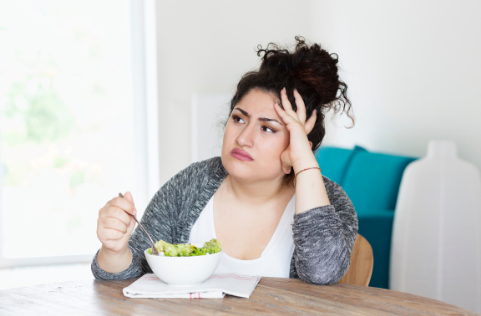It is far too often that we hear binge eating be attributed to a lack of self-control or will-power. Not only is this idea completely false, but it also intensifies any feelings of guilt or shame that accompany a binge. Believe it or not, there are a number of reasons that a binge may happen, and none of them have to do with a lack of willpower.
Before we get into why binge eating might be happening and how to prevent it, we must first talk about what binge eating disorder really is.
What is Binge Eating Disorder (BED)?

Binge eating is a diagnosable disorder that is characterized by recurring episodes of eating large quantities of food, often combined with feeling “out-of-control.” Technically, according to the Diagnostic and Statistical Manual of Mental Disorders (DSM-5), there are two criteria that must be met to diagnose BED:
-
- Eating, in a discrete period of time, an amount of food that is definitely larger than what most people would eat in a similar period of time under the same circumstances.
- A sense of lack of control over eating during the episode.
Along with these two things, binge eating episodes are also characterized by any three of the following:
-
- Eating more rapidly than usual
- Eating until uncomfortably full
- Eating large amounts of food when not feeling physically hungry
- Eating alone due to feelings of embarrassment with eating
- Feelings of guilt and shame after the episode
Unlike bulimia nervosa or purging disorder, BED is not associated with the act of getting rid of food in some way (i.e. exercise, vomiting).
Though binge eating disorder is a diagnosable, dangerous condition that can impede one’s quality of life, it is very much treatable!
Another thing to note is that even if you do not meet the diagnostic criteria for BED, it is possible to have binge eating episodes or tendencies, which we understand can still bring up negative feelings.
In most cases, there are triggers that can lead to a binge, and there are even physiological reasons that a binge can occur. By identifying these triggers, you and your registered dietitian can work together to create strategies to minimize the risk of a binge episode.
Before talking about how to minimize this risk, we want to highlight some common reasons that binging occurs.
4 common triggers for a binge
1. restricting intake

This is probably the most common thing that we see as a trigger to a binge. Whether the restriction of intake is intentional or unintentional, undernourishment will eventually put your body into a “low energy availability” state. When this happens, your body essentially calls out for more nourishment.
Though you may not feel hunger cues at mealtimes, you may find that you are not satisfied with your usual portion size. Or, perhaps you find that you feel out of control as you are eating, and can’t stop, even if you feel full. This is because your body is trying to make up for what it has been missing.
2. food rules around meal or snacks
One of the more common black and white thoughts that we hear around food is “I’m just going to have one bite." This often happens with foods that have been deemed “bad foods.” However, as we know, the more we demonize foods, the more appeal that they have and the more we want them.
Think about a time when you have been told not to do something by a parent or teacher - what happens? You always want to do it more, right? Same idea when it comes to food. When you tell yourself not to eat more than ‘x,’ you will inherently want to keep eating more, which can lead to a binging episode.
3. Experiencing difficult emotions

For many, eating is a coping mechanism for dealing with negative emotions such as stress, anxiety, or anger. Yes, food is comforting, and eating is a perfectly human reaction to negative emotions. However, it can also lead to a binge, especially when combined with other things in this list.
4. needing an increase in balance at meal times
Now, you may not be skipping meals, but you might be missing some key parts of meals and snacks. If you are following a 3x3x3 meal plan but are skimping on the starches or the proteins, your body will begin to crave these things as a result. This can lead to intense cravings of what you are missing.
How to Minimize the Risk of a Binge

First and foremost, meeting your energy needs on a daily basis is crucial in preventing a binge. This is where working with an eating disorder dietitian is SO important. Your needs are incredibly individual and talking with someone 1:1 can allow for more specific dietary advice.
Now, this is easier said than done, but addressing your own food rules and/or fear foods can be a huge step in preventing binges. By re-incorporating fear foods and finding food freedom, you can truly enjoy meals and snacks without black and white thoughts that can lead to a binge.
Finally, you’ve heard us talk about self-care over and over again. This is because we strongly believe that developing coping skills that support self-care can help re-center yourself on your road to recovery. Further, these tools can serve as alternative ways to cope with negative emotions that can lead to a binge.
One of the most common misconceptions about binging is that it is all about a lack of self-control or willpower. As you can see, there are a number of things that can predispose you to a binge, and not one of them has to do with self-control. Remember - give yourself some grace as you navigate recovery. We are here to chat if you have any questions or concerns - drop us a line!
Comments Off on Why Does Binge Eating Happen?